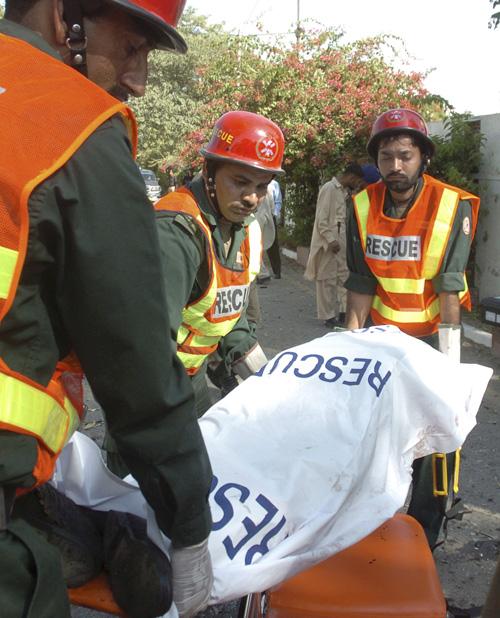Suicide blast in Pakistan kills 7 people
Pakistani rescue workers remove a dead body at the site of a suicide bombing in Rawalpindi, Pakistan on Tuesday. Erica Magda
Oct 31, 2007
Last updated on May 12, 2016 at 06:06 p.m.
ISLAMABAD, Pakistan – A bomber blew himself up about a quarter-mile from President Gen. Pervez Musharraf’s office Tuesday, killing seven people and deepening Pakistan’s insecurity ahead of crucial elections.
Officials said the attacker detonated his explosives among police at a checkpoint in the garrison city of Rawalpindi, just south of the capital, Islamabad.
Musharraf was safely inside Army House, about a quarter-mile away, where the blast was clearly heard, said presidential spokesman Rashid Qureshi. The checkpoint guards a road leading to the president’s compound and the residences of several top generals.
Police said three of their officers and four civilians were killed, along with the lone assailant. Fourteen policemen and four civilians were wounded.
Get The Daily Illini in your inbox!
“When police officers asked him to halt, the attacker panicked. And as the police tried to capture him, he blew himself up,” city police chief Saud Aziz told The Associated Press. “Our officers died to protect the citizens of Pakistan.”
There was no claim of responsibility, and Qureshi would not speculate on who might be to blame.
Pakistan has been rocked by a string of suicide bombings mostly blamed on Islamic extremists, including the bombing of former Prime Minister Benazir Bhutto’s homecoming parade. The Oct. 18 blast killed more than 140 people in the southern port of Karachi.
Musharraf went ahead Tuesday with the scheduled opening of a highway linking Islamabad with the northwest and warned extremists to stop killing fellow Muslims or face stern action.
“These terrorists and extremists elements must not retard the country’s economic development by their senseless acts,” Musharraf said, according to state-run Pakistan Radio.
The suicide attack left the area around the checkpoint strewn with human flesh and torn clothing.
An AP photographer saw emergency workers remove the body of an elderly man killed while riding by on a bicycle. Police said women and children aboard a passing minibus were among the dead and wounded.
Bhutto vowed Tuesday to continue campaigning, saying she would visit Rawalpindi on Nov. 9 despite the violence. She said, however, that she would no longer hold processions like the one that was attacked Oct. 18.
Pakistan has been hit by a series of suicide bombings since Musharraf cracked down on militants near the Afghan border in July. Two blasts killed 25 people in Rawalpindi on Sept. 4.
The government acknowledges the border area has become a haven for Taliban militants. The U.S. worries al-Qaida might be using it to plot new attacks.
Last week, authorities sent troops to tackle supporters of a pro-Taliban cleric in the northwestern district of Swat. Officials say four days of violence there left around 100 people dead.
About 5,000 tribesmen rallied Tuesday to demand a halt to military operations against militants in the northwest. The protest was led by Faqir Mohammed, an alleged Pakistani associate of al-Qaida’s leaders who is being sought for allegedly harboring foreign militants.
Faqir Mohammed was guarded by hundreds of supporters. The rally took place in the Bajur tribal region bordering Afghanistan, where a missile attack on a school killed 80 people a year ago.
Musharraf is widely expected to join forces with Bhutto in a U.S.-friendly alliance after January parliamentary elections. However, their emerging coalition must survive a number of legal challenges that are being considered by the Supreme Court.
Bhutto and Musharraf say moderates must cooperate to defeat extremism – making them targets for Islamic hard-liners, who deride them as American stooges.
Associated Press writers Munir Ahmad and Sadaqat Jan in Islamabad and Zarar Khan in Karachi contributed to this report






